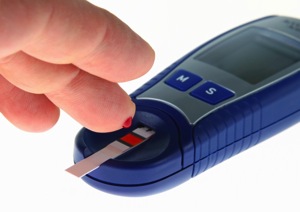
Often chronic health problems can be traced back to one thing: unstable blood sugar that comes from eating too many desserts, sweet coffee drinks, processed grains (bread, pasta, etc.), and other starchy foods. Our cultural complacency with high-carbohydrate diets has made us the most obese and chronically sick population in the world.
How blood sugar becomes imbalanced
We only needs about a teaspoon's worth of sugar in the bloodstream at any one time, a level we can meet just by eating vegetables. Consistently indulging in high-carb foods — dessert, pasta, potatoes, rice, sweet coffee drinks – requires the pancreas to secrete increasingly larger amounts of insulin to lower overly high blood sugar. These insulin surges cause blood sugar to drop too low and create symptoms. As a result, you crave sugar or high-carb foods to reboot your blood sugar, which starts the whole cycle all over again. Although these blood sugar highs and lows constitute a normal day for many Americans, they underpin many chronic health issues, including hormonal issues, autoimmune flare ups, fatigue, depression, anxiety, insomnia, poor brain function, chronic pain, and more.
Eventually, these extremes exhaust the body's cells. In a move of self-protection they turn off their receptors for insulin so that neither insulin nor glucose can get into the cells. This is called becoming insulin resistant and is a stepping-stone to diabetes. Blood sugar levels remain too high in the bloodstream, damaging the arteries and the brain, while glucose can't get into the cells to make energy, causing fatigue. The excess glucose in the bloodstream is eventually converted to fat for storage.
What is normal blood sugar
You can test your fasting blood sugar with a store-bought glucometer Fasting means you have gone at least 12 hours without eating or drinking anything other than water; it's best to test first thing in the morning.
The lab range for fasting blood glucose levels is usually 70 to 105 mg/dL. In functional medicine we like to see your fasting blood glucose level between 85 and 99 and consider anything over 100 to signify insulin resistance. The American Diabetic Association designates a fasting blood sugar level of 106 to 126 to be insulin-resistant or prediabetes, while anything above 127 is diabetes.
Symptoms of low blood sugar
If your blood sugar is below 85, it is important that you eat every two to three hours to keep blood sugar stable. You don't have to eat a whole meal, just a few bites of a low-carb, sugar-free snack between meals and a light snack before bed.
- Craving for sweets
- Irritability if meals are missed
- Dependency on coffee for energy
- Becoming lightheaded if meals are missed
- Eating to relieve fatigue
- Feeling shaky, jittery, or tremulous
- Feeling agitated or nervous
- Become upset easily
- Poor memory, forgetfulness
- Blurred vision
- Insulin Resistance
Symptoms of high blood sugar
If your blood sugar is over 99 you may have insulin resistance. You need to moderate your carb intake so you don't feel sleepy after meals and avoid overeating. It's also important to exercise regularly to help the cells become more sensitive to insulin. If your blood sugar is over 126 you should be screened for diabetes.
- Fatigue after meals
- General fatigue
- Constant hunger
- Craving for sweets that is not relieved by eating them
- Must have sweets after meals
- Waist girth equal to or larger than hip girth
- Frequent urination
- Increased appetite and thirst
- Difficulty losing weight
- Migrating aches and pains
Ask my office for more advice on balancing your blood sugar for better health.



Latest from the Blog
Navigating Tick-Borne Infections: Ozone Therapy as a Holistic Approach to Lyme Disease and Co-Infections
April 8, 2024Tick-borne infections, particularly Lyme disease and its co-infections, pose a significant health challenge for individuals worldwide. Characterized by complex symptoms and often elusive diagnoses, these infections can wreak havoc on the body’s immune system and overall well-being. Amidst the conventional treatments available, there’s a growing interest in exploring complementary therapies such as ozone therapy within […] Read more
Latest from the Blog
Unlocking Hope: Ozone Therapy as a Complementary Approach to Cancer
Cancer remains one of the most challenging health issues of our time, affecting millions of lives worldwide. While conventional treatments such as chemotherapy and radiation therapy have made significant strides in cancer management, many patients seek complementary approaches to enhance their treatment outcomes and alleviate side effects. Ozone therapy, a promising modality in functional and […] Read more